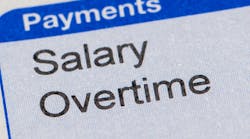Human Resources Questions for Dentists: Handling non-exempt employee pay, and overtime pay
___________________________________________________________________
QUESTION: I have a non-exempt employee who’s paid on a salary basis. She is typically scheduled to work 38 hours a week. If she works more, for example 42 hours, am I required to pay her more? Likewise, if she works less, can I deduct for hours not worked?
ANSWER: As a non-exempt employee, she must be paid only for hours actually worked. The rate of pay must be at least minimum wage or higher. Furthermore, when a non-exempt employee works more than 40 hours for the week, she must be paid time and one-half for overtime.
Weekly salary can be based on any number up to 40 in a week. It appears you have this set up to be a salary based on 38 hours a week. In this case, any work over 38 must be paid, which would include applicable overtime. For example, if the employee works 40 hours, two extra hours of pay is due. If, as in your example, the employee works 42 hours, she is entitled to four hours of extra pay with two hours being paid at the overtime rate.
This also means that the employer can dock salary payments when the full shift is not worked. For example, if the employee works only 30 hours, she could have her salary reduced by eight hours unless there is a paid time off benefit available to offset the loss of hours.
It’s important that you review how the agreement was originally set up and whether there is anything in writing about it. If you have an agreement that the salary will be paid if the employee works less, then that agreement will stand no matter what the law says an employer can do.
QUESTION: I offer a vacation and sick leave benefit. I have an employee who called in sick for two days and, therefore, used 16 hours of sick time. She then went on to work 30 hours for the week. This puts her pay at 46 hours for the week. She believes she is now entitled to overtime. I don’t think she is.
ANSWER: You are correct. Overtime is counted only for hours actually worked, not hours paid. Employers must pay time and one-half for all hours worked over 40 in a week (and/or eight in a day in California). Therefore, any paid time off benefit, whether it’s vacation, sick, PTO, or something else, does not count toward overtime hours for the week.
RECENT HUMAN RESOURCES QUESTIONS
Understanding at-will employment
Is this office required to interview male applicants?
Can employer reveal embezzlement to potential employers seeking recommendations?
Visit DentistryIQ and search "Human Resources" for many more HR issues for dentists.
Human Resources Questions for Dentists is provided by Rebecca Boartfield and Tim Twigg of Bent Ericksen & Associates. Tim Twigg is president and Rebecca Boartfield is a human resources compliance consultant with Bent Ericksen & Associates. For 30 years, the company has been a leading authority in human resource and personnel issues, helping dentists deal successfully with the ever-changing and complex labor laws. To receive a complimentary copy of the company’s quarterly newsletter or to learn more about its services, call (800) 679-2760 or visit bentericksen.com.
For the most current practice management headlines, click here.
For the most current dental headlines, click here.
About the Author

Rebecca Boartfield and Tim Twigg
Human Resources Experts
Tim Twigg is president and Rebecca Boartfield is a human resources compliance consultant with Bent Ericksen & Associates. For 30 years, the company has been a leading authority in human resource and personnel issues, helping dentists deal successfully with the ever-changing and complex labor laws. To receive a complimentary copy of the company’s quarterly newsletter or to learn more about its services, call (800) 679-2760 or visit bentericksen.com.

